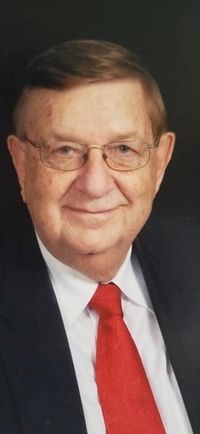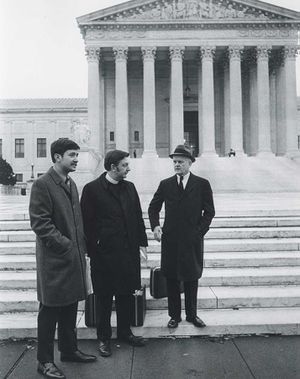Difference between revisions of "Lindholm, William C. (1932-2020)"
| [checked revision] | [checked revision] |
SamSteiner (talk | contribs) |
SamSteiner (talk | contribs) |
||
| (2 intermediate revisions by the same user not shown) | |||
| Line 1: | Line 1: | ||
__TOC__ | __TOC__ | ||
| − | |||
[[File:Lindholm-William.jpg|200px|thumb|''William Lindholm.<br />Photo courtesy of Herman Bontrager'']] | [[File:Lindholm-William.jpg|200px|thumb|''William Lindholm.<br />Photo courtesy of Herman Bontrager'']] | ||
| + | [[File:Lindholm-in-DC-reduced.jpg|300px|thumb|''L-R: Thomas C. Eckerle (attorney), William C. Lindholm, and William B. Ball (attorney) in front of the Supreme Court of the United States in late 1971 when the Amish education case was being heard.<br />Photo courtesy of Mennonite Central Committee. IX-12-6'']] | ||
William C. Lindholm: Lutheran minister and longtime chair of the National Committee for Amish Religious Freedom, which supported the rights of [[Amish]] and other conservative Anabaptists in the [[United States of America|United States]] to practice their faith, most famously through a 1972 U.S. Supreme Court case Wisconsin v. Yoder. Lindholm was born in Ogden, [[Iowa (USA)|Iowa]], on 20 March 1932, to Lester L. Lindholm (5 July 1898-10 November 1955) and Elizabeth Winegar (27 March 1904-1943). He graduated from Augustana College (1954) and Lutheran School of Theology (1958), both in [[Illinois (USA)|Illinois]], and served as pastor at Grace Lutheran Church in East Tawas, [[Michigan (USA)|Michigan]], from 1958 to 1970 and then at Holy Cross Lutheran Church in Livonia, Michigan, from 1970 until 2002. Both congregations were part of what became, in 1988, the Evangelical Lutheran Church in America. In 1952 he married Patricia Schneider (18 June 1932-18 June 2018); the couple had three children and two grandchildren. William Lindholm died on 9 May 2020, in Livonia, Michigan. | William C. Lindholm: Lutheran minister and longtime chair of the National Committee for Amish Religious Freedom, which supported the rights of [[Amish]] and other conservative Anabaptists in the [[United States of America|United States]] to practice their faith, most famously through a 1972 U.S. Supreme Court case Wisconsin v. Yoder. Lindholm was born in Ogden, [[Iowa (USA)|Iowa]], on 20 March 1932, to Lester L. Lindholm (5 July 1898-10 November 1955) and Elizabeth Winegar (27 March 1904-1943). He graduated from Augustana College (1954) and Lutheran School of Theology (1958), both in [[Illinois (USA)|Illinois]], and served as pastor at Grace Lutheran Church in East Tawas, [[Michigan (USA)|Michigan]], from 1958 to 1970 and then at Holy Cross Lutheran Church in Livonia, Michigan, from 1970 until 2002. Both congregations were part of what became, in 1988, the Evangelical Lutheran Church in America. In 1952 he married Patricia Schneider (18 June 1932-18 June 2018); the couple had three children and two grandchildren. William Lindholm died on 9 May 2020, in Livonia, Michigan. | ||
Latest revision as of 09:51, 22 July 2020
William C. Lindholm: Lutheran minister and longtime chair of the National Committee for Amish Religious Freedom, which supported the rights of Amish and other conservative Anabaptists in the United States to practice their faith, most famously through a 1972 U.S. Supreme Court case Wisconsin v. Yoder. Lindholm was born in Ogden, Iowa, on 20 March 1932, to Lester L. Lindholm (5 July 1898-10 November 1955) and Elizabeth Winegar (27 March 1904-1943). He graduated from Augustana College (1954) and Lutheran School of Theology (1958), both in Illinois, and served as pastor at Grace Lutheran Church in East Tawas, Michigan, from 1958 to 1970 and then at Holy Cross Lutheran Church in Livonia, Michigan, from 1970 until 2002. Both congregations were part of what became, in 1988, the Evangelical Lutheran Church in America. In 1952 he married Patricia Schneider (18 June 1932-18 June 2018); the couple had three children and two grandchildren. William Lindholm died on 9 May 2020, in Livonia, Michigan.
Lindholm first became acquainted with the Amish in the 1960s when he was developing a Lutheran summer camp in Oscoda County, Michigan, near the Mennonite and Amish community there, and hired Amish men to help construct the camp. As Lindholm learned more about their faith and life, he took an interest in the conflicts then brewing around Amish resistance to compulsory high school attendance, particularly in his home state of Iowa. At the time, the states of Pennsylvania and Ohio, as well as some jurisdictions in Indiana, had exempted the Amish, but other states had not done so and Amish parents in Iowa and elsewhere we being arrested for not sending their children to consolidated public schools.
Disturbed by the heavy-handed treatment of the Amish by authorities, Lindholm began speaking up on their behalf and drawing attention to what he saw as a clear principle that religious liberty should include not only the freedom to believe, but also the freedom to practice one’s beliefs. At a March 1967 conference at the University of Chicago on public regulation of private schools, Lindholm gathered a group of lawyers, academics, and civil rights advocates and formed the National Committee for Amish Religious Freedom.
In 1968, the National Committee offered legal assistance to three Amish and Amish-Mennonite fathers arrested in Wisconsin for failing to send their children to high school. The case, Wisconsin v. Yoder, moved through state courts and then to the U.S. Supreme Court, where in 1972 the justices unanimously sided with the Amish. The case set a precedent for other religious liberty causes and helped legitimate alternative approaches to education, such as the Navajo community-led school movement.
In the decades that followed the Yoder case, Lindholm made innumerable calls to government offices, arranged legal counsel and raised funds to defend the Amish in court. He accompanied Amish people to meetings with officials, local and national, to explain Amish concerns. Lindholm’s position as a Lutheran clergyman who framed issues in terms of constitutional rights was often crucial in establishing credibility for conservative Anabaptist convictions that might otherwise have been dismissed as merely expressions of sectarian culture.
The National Committee, under Lindholm’s leadership, advocated for Amish concerns involving the regulation of horse-drawn buggies, hospitalization costs, land use and zoning issues, farmland preservation, and driver’s license photos, as well as military conscription, workers’ compensation insurance, child custody rights, building codes, photo identification for immigration and border crossing, jury duty, compulsory flag flying and pledging of allegiance, among others.
Bibliography
Lindholm, William C., “The National Committee for Amish Religious Freedom,” 109-23, in The Amish and the State, sec. ed., edited by Donald B. Kraybill (Baltimore: Johns Hopkins University Press, 2003).
Wisconsin v. Yoder, 406 U.S. 205 (1972). Web. 15 June 2020. https://www.oyez.org/cases/1971/70-110.
Additional Information
National Committee For Amish Religious Freedom. Website. 15 June 2020. https://www.amishreligiousfreedom.com/.
| Author(s) | Steven M Nolt |
|---|---|
| Date Published | June 2020 |
Cite This Article
MLA style
Nolt, Steven M. "Lindholm, William C. (1932-2020)." Global Anabaptist Mennonite Encyclopedia Online. June 2020. Web. 3 Feb 2026. https://gameo.org/index.php?title=Lindholm,_William_C._(1932-2020)&oldid=168945.
APA style
Nolt, Steven M. (June 2020). Lindholm, William C. (1932-2020). Global Anabaptist Mennonite Encyclopedia Online. Retrieved 3 February 2026, from https://gameo.org/index.php?title=Lindholm,_William_C._(1932-2020)&oldid=168945.
©1996-2026 by the Global Anabaptist Mennonite Encyclopedia Online. All rights reserved.

